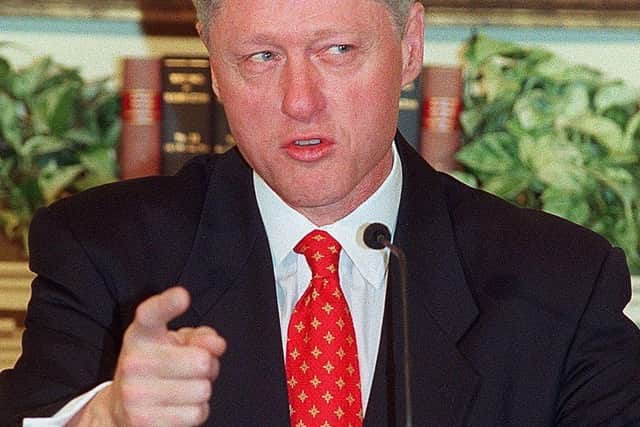Bill Clinton-Monica Lewinsky scandal: Lessons from shaming of White House intern are still to be learned – Martyn McLaughlin
A great deal has been said and written about that episode of modern American history which, in many ways, seems to belong to another era. How curious it is to look back and be reminded of how Clinton’s denials were shoehorned into the last 20 seconds of a seven-minute-long White House news conference on daycare education. It was almost as if no one quite knew how to address the issue, or contextualise it.
In other ways, however, it is a scandal that remains very much with us, having made an indelible impact on political discourse both in the US and further afield, and forever altering the way politics is conducted and covered. Stewart Verdery, a former lawyer for the US Senate Republican leadership at the time, reflected earlier this week on how the incident shifted the goalposts.
Advertisement
Hide AdAdvertisement
Hide Ad“If you’re the opposition and the other party has committed a foul, pre-Clinton there was a hesitation to rush to judgment – the innocent until proven guilty sort of thing,” he told the New York Times. “And post-Clinton, everyone goes right to Defcon 1.”


In some ways, that legacy of polarisation was of Clinton’s own making. During the subsequent impeachment proceedings in the Republican-controlled House of Representatives, he enjoyed the highest job approval ratings of his administration; a key reason for that was the way he and his aides weaponised the partisanship of his opponents, ensuring that even those Democrats with misgivings over his conduct stood by his side.
The bitterly contested election in 2000 did little to help this downward slide, and in the two decades since, the entrenchment and downright nastiness has only grown worse. Nowadays, the very idea of bipartisan cooperation seems like a relic from a distant age. Politics, and those served by it, are poorer as a consequence.
In other ways, thankfully, lessons have been learned from what was the first major political scandal in the emerging age of the internet and rolling news networks. Which is not to say that there is no room for further progress.
At the time, one of the prevailing narratives focused on how Clinton had failed his wife and his family, as well as letting down the country he had been elected to lead. Only on the periphery of the discussion was there talk of how the most powerful man in the world had exploited a young employee.
Whenever Ms Lewinsky was mentioned, blame was not far away. There was an overbearing emphasis on whether the affair was consensual, without any understanding of power dynamics and the abuse of them. She was attacked for her sexuality and her body shape, and her very name became synonymous with a sex act. The assassination of her character became a sport.
One news anchor characterised her as a “predatory girl who had set her sights on the president”. High-profile US talk show hosts relished in smears and shaming, such as when Jay Leno, discussing Ms Lewinsky’s weight, told his audience: “She told reporters she was even considering having her jaw wired shut, but then, nah, she didn’t want to give up her sex life.”
Even on those occasions when the question of Ms Lewinsky’s victimhood was given room to breathe, some feminists who might have rallied to her side focused instead on the issues of agency and consent. “There is no evidence to suggest that Ms Lewinsky's will was violated,” wrote the essayist, Gloria Steinem. “Quite the contrary."
Advertisement
Hide AdAdvertisement
Hide AdFrankly, it is nothing short of a miracle that Ms Lewinsky, now a prominent anti-bullying advocate and activist, possessed the fortitude and resilience to come out the other side. Thankfully, she has emerged stronger, and her articulate reflections on the way she was treated have helped countless other women.
All of which raises the question of how the scandal would be framed – and how Ms Lewinsky would be treated – were it to break during the news cycle of today. Fortunately, the media ecosystem now has prominent spaces for victims to speak in their own voices and on their own terms.
Yet we would do well to remember how the same media had only a limited impact when scrutinising the misogyny of a presidential candidate who boasted of grabbing women by the *****. The fact that the candidate was triumphant, and is seeking re-election, speaks to deeper problems yet to be solved.
Equally importantly, while we can say with some confidence that 25 years on, the vile obsession of degrading and discrediting a woman on account of her physical appearance is given short shrift in the mainstream media, that provides no reassurances that a young woman would not be the subject of vicious slurs. Indeed, given the ubiquity of our online lives, it would be naive to suggest the abuse would not be worse this time around, thanks to the rampant misogyny that is allowed to proliferate unchecked on the likes of Twitter.
And as Ms Lewinsky herself observed in a recent article for Vanity Fair, the more menacing aspects of social media have ensured that the impact of the “24/7 scandal cycle” is even more devastating to lives, careers, reputations, and the public discourse. A quarter of a century after a pivot point that changed everything, Ms Lewinsky has reclaimed her agency. Society at large, sadly, still has lessons to learn.
Comments
Want to join the conversation? Please or to comment on this article.